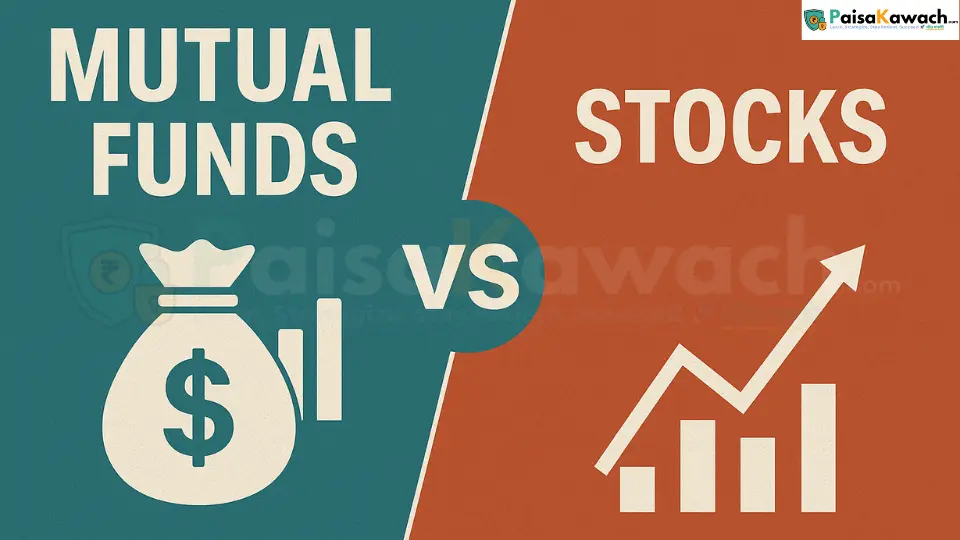When it comes to wealth building, one of the most common dilemmas investors face is whether to choose mutual funds or dive straight into direct stock investing. Both strategies have unique advantages, but their suitability depends on an individual’s financial goals, risk appetite, time commitment, and knowledge of the market. In 2025, with market volatility and global economic shifts, this debate has become even more relevant.
This blog will break down the comparison between mutual funds and direct stocks, not with generic textbook definitions, but with a realistic look at their strengths, weaknesses, and scenarios where each shines. Whether you’re a beginner or a seasoned investor, this guide will help you make an informed decision.
Understanding the Basics
What Are Mutual Funds?
A mutual fund is essentially a professionally managed pool of money collected from multiple investors. These funds invest in stocks, bonds, or other securities. Professional fund managers make the buy-sell decisions, aiming to generate returns that align with the fund’s objective (e.g., growth, income, or balanced returns).
Example: If you invest ₹5,000 in an equity mutual fund, your money is combined with funds from thousands of investors, creating a diversified portfolio. You indirectly own parts of companies like TCS, HDFC, or Reliance, depending on the fund’s holdings.
What Is Direct Stock Investing?
Direct stock investing means purchasing individual company shares on your own. You own a portion of the company and your returns depend on the price appreciation of that stock and any dividends paid. Unlike mutual funds, there’s no professional manager – you call the shots, do your own research, and build your own portfolio.
Example: If you buy 10 shares of Infosys at ₹1,500 per share, you directly own those shares and can sell them whenever you want. Your gain or loss depends entirely on Infosys’ performance and market conditions.
Key Differences Between Mutual Funds and Direct Stocks
While both involve equity markets, their differences are substantial:
- Management: Mutual funds are professionally managed, while stock investing is self-directed.
- Risk: Stocks carry higher risk due to single-company exposure. Mutual funds offer diversification to reduce risk.
- Returns: Stocks can deliver higher returns if chosen well, but mutual funds provide relatively stable, market-linked returns.
- Time & Effort: Stock investing requires extensive research. Mutual funds are more ‘hands-off.’
- Costs: Mutual funds charge an expense ratio, while stock investing incurs only brokerage fees.
Advantages of Mutual Funds
Mutual funds are particularly appealing for investors who want professional management and reduced volatility.
- Professional Expertise: Fund managers analyze markets, track performance, and make decisions on your behalf.
- Diversification: Even with a small investment, you gain exposure to multiple companies and sectors.
- Flexibility: Systematic Investment Plans (SIPs) allow you to invest small amounts regularly.
- Lower Entry Barrier: You can start with as little as ₹500 per month.
Advantages of Direct Stock Investing
Direct stock investing is for individuals who enjoy researching companies and are willing to take calculated risks.
- High Earning Potential: A well-picked stock can deliver multibagger returns over time.
- Full Control: You decide when to buy, hold, or sell.
- Low Ongoing Costs: No fund management charges; you pay brokerage only on trades.
- Learning Opportunity: Investing directly sharpens your understanding of markets and business models.
Risks and Challenges
Risks with Mutual Funds
Mutual funds, while diversified, are not risk-free. Market downturns, underperforming fund managers, or high expense ratios can eat into your returns. Also, fund performance depends on the overall portfolio; you cannot control individual stock holdings.
Risks with Stocks
Direct stock investing is riskier due to high volatility and single-company exposure. Without proper research or a disciplined approach, investors can face significant losses, especially in short-term trading scenarios.
Who Should Choose Mutual Funds?
Mutual funds are better suited for:
- Beginners with limited stock market knowledge.
- People who prefer a passive approach to investing.
- Those looking for steady, long-term wealth creation.
- Individuals with smaller amounts to invest (via SIPs).
Who Should Choose Direct Stock Investing?
Direct stocks are better suited for:
- Experienced investors who can analyze financial statements.
- People willing to devote time to track market trends and company news.
- Individuals with a higher risk appetite and long-term goals.
Hybrid Approach: Can You Have Both?
A growing number of investors prefer a hybrid strategy. They allocate a portion of their funds to mutual funds for stability and invest directly in a few stocks they believe in for higher growth potential. This balanced approach blends the benefits of both worlds.
Real-Life Example of Returns
Consider this scenario:
If you invested ₹1,00,000 in an equity mutual fund 5 years ago with an annualized return of 12%, your corpus would now be around ₹1,76,000. However, if you picked a top-performing stock like TCS or Infosys during the same period, your returns could be significantly higher – but only if you made the right pick.
How to Decide?
Your decision depends on factors like risk tolerance, knowledge, time, and financial goals. Ask yourself:
- Do I have the time and skill to research stocks?
- Can I handle volatility without panic-selling?
- Am I comfortable paying fees for professional management?
Conclusion: Mutual Funds or Stocks?
There is no universal answer to this debate. Mutual funds provide simplicity, professional management, and diversification, while direct stocks offer control and potentially higher returns. A realistic approach is to evaluate your strengths and limitations, then choose the strategy that aligns with your goals.
Final Tip: For most beginners, starting with mutual funds and gradually learning about stock investing is the safest path. As your confidence grows, you can create a blended portfolio of both.
mutual funds vs stocks 2025, direct stock investing vs mutual funds, which is better mutual funds or stocks, stock investing guide 2025, mutual fund returns vs stocks, long-term investing options, beginner investment strategies 2025, stock vs fund pros and cons, wealth building with mutual funds, stock market vs SIPs, equity mutual funds vs shares, safe investment 2025, passive vs active investing, stock portfolio strategy 2025, mutual fund guide for beginners

 Will AI‑Driven Stocks Ignite a Global Market Upswing in 2025?
Next →
Will AI‑Driven Stocks Ignite a Global Market Upswing in 2025?
Next →
 Best Low-Risk Investment Options in 2025 for Steady Monthly Income
Best Low-Risk Investment Options in 2025 for Steady Monthly Income